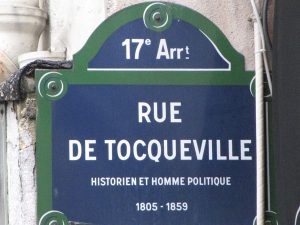 In 1831, Alexis de Tocqueville set sail for America with his friend and traveling companion Gustave de Beaumont. The voyage by sea from Le Havre in France to Newport, Rhode Island took 37 days, and he and Beaumont would spend the next nine months traveling through America, ostensibly to study the prison system, but of course, taking in much more information than that. It is astonishing to recall that he was only 25 years old when he set sail, and that his famous work, Democracy in America, was published only 4 years after he returned. (Leo Damrosch’s excellent new book on Tocqueville, Tocqueville’s Discovery of America reminds us that Charles Darwin (then 22 years old) set sail in The Beagle just as Tocqueville and Beaumont were traveling the Mississippi River. It seems that 1831 was a very auspicious year indeed for great discoveries).
In 1831, Alexis de Tocqueville set sail for America with his friend and traveling companion Gustave de Beaumont. The voyage by sea from Le Havre in France to Newport, Rhode Island took 37 days, and he and Beaumont would spend the next nine months traveling through America, ostensibly to study the prison system, but of course, taking in much more information than that. It is astonishing to recall that he was only 25 years old when he set sail, and that his famous work, Democracy in America, was published only 4 years after he returned. (Leo Damrosch’s excellent new book on Tocqueville, Tocqueville’s Discovery of America reminds us that Charles Darwin (then 22 years old) set sail in The Beagle just as Tocqueville and Beaumont were traveling the Mississippi River. It seems that 1831 was a very auspicious year indeed for great discoveries).
Tocqueville had studied law, and as a lawyer, and particularly an American lawyer trained in the U.S. and France, I find his work almost irresistible. His observations on the American legal and political system are astonishing in their perceptiveness and sophistication, whether on the death penalty, slavery, democracy or the importance of an independent judiciary. He likened American lawyers to an aristocracy, but not necessarily in the most complimentary of ways, suggesting that “to the democratic instincts of the people, they secretly oppose their aristocratic inclinations; to the people’s love of novelty, their superstitious respect for the old . . .,” etc., hardly a flattering comparison!
In his introduction to Democracy in America, he suggests that “equality of conditions” was what set the United States apart from Europe, and opined that all societies were headed towards a situation in which equality would prevail, including France. His vision of the United States as an open society where democratic principles of equality could flourish peacefully “in harmony with mores. . . and peacefully within the law” was almost utopic and contrasted with his view of French democracy as “toppling anything that stood in its way, shaking what it did not destroy.” (He was, after all, a member of the aristocracy who had lost close family members to the guillotine).
At the same time, Tocqueville was deeply critical of the institution of slavery and seemed keenly aware of America’s flaws just as much of his virtues.
As I begin my séjour as a Fulbright scholar, fortunate enough to have received a chair named for this most famous son of France, I wonder what Tocqueville would think of America (and France) today. With recent news stories reporting that the United States among Western nations is now one of the most unequal of societies, and with serious efforts underway to repeal or undermine birthright citizenship, I wonder what he would think of our “new world” as compared to la vieille France? Was the American experiment in democracy successful? Is democracy, or “equality of conditions” inevitable? And what would he think about global as opposed to national inequalities – surely someone as upset as he was by the settlers’ treatment of America’s indigenous peoples, and critical of slavery, would find today’s global inequalities problematic too?
On a more practical note, I can imagine he might be jealous of the mere 14 hours it took me to travel from St. Louis, Missouri to Paris; but perhaps he would be less envious of the hustle and bustle of modern life.
During this séjour in France, I look forward to discussing these and other subjects with my students and colleagues at the University of Cergy-Pontoise, and learning from them about modern France, and sharing my love of international criminal law and human rights with them.
I also hope to discover why he did not stop in St. Louis, Missouri, a former French city on the banks of the great Mississippi River that held so much fascination for him! (If anyone knows, please feel free to comment!)
